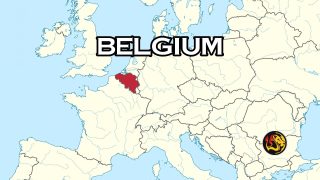
By Stefan J. Bos, Chief International Correspondent Worthy News
BUDAPEST/BRUSSELS (Worthy News) – Conservative nationalist Bart De Wever has been sworn in as Belgium’s new prime minister after he toned down his rhetoric to make the nation’s Dutch-speaking Vlaanderen (Flanders) region an independent country.
His premiership also followed seven months of tough talks on moving Belgium further to the right, a move welcomed by nationalist Hungarian Prime Minister Viktor Orbán, who has long been isolated within the European Union.
De Wever and Orbán were already seen smiling at an EU event. The coalition agreement struck Friday allowed the 54-year-old to take the oath of office before King Philippe in a ceremony at the royal palace in Brussels.
From there, he was due to head straight to a gathering of European Union leaders a few blocks away for talks on defense and transatlantic relations. Brussels hosts the EU institutions, including the 27-nation bloc’s European Parliament.
Split between French- and Dutch-speaking communities and with a highly complex political system, Belgium has seen records-breaking protracted coalition discussions – reaching 541 days in 2010-11.
This time, five groups sought to forge a coalition after June elections that failed to produce a clear majority – with talks led by De Wever’s conservative N-VA, which claimed the most seats.
The new government brings together three parties from Dutch-speaking Flanders: De Wever’s N-VA, the centrist Christian Democrats, and the leftist Vooruit (Onward).
FRENCH SPEAKING
It includes two from French-speaking Wallonia: the centrist Les Engages and the centre-right Reformist Movement. Together, they hold an 81-seat majority in Belgium’s 150-seat parliament.
Coalition talks over plugging the country’s budget deficit—4.4 percent of gross domestic product in 2023—hit a wall during the summer.
Belgium is one of seven European Union countries facing disciplinary action for running a deficit above 3 percent of Gross Domestic Product (GDP), violating the EU’s fiscal rules.
De Wever, the mayor of Antwerp since 2013, pushed for cuts in social benefits and pension reforms that have already sparked opposition from labor unions.
He is also critical of migration, an essential issue in Belgium, where many have arrived from mainly Muslim war-torn and impoverished nations.
De Wever’s N-VA was part of a right-leaning ruling coalition between 2014 and 2018. He takes over as prime minister from Alexander De Croo, whose seven-party coalition took 493 days to emerge in 2019-20.
De Croo had stayed as caretaker leader after the June elections, enabling them to take his time hammering out a complex government agreement.
Copyright 1999-2026 Worthy News. This article was originally published on Worthy News and was reproduced with permission.
Latest News from Worthy News
Japan’s first-ever female prime minister was effectively re-elected as her Liberal Democratic Party (LDP) recorded its strongest performance in snap parliamentary elections in the country’s post-war history.
Senior Hamas leader Khaled Mashaal on Sunday reaffirmed the terrorist group’s refusal to disarm, rejecting demands from U.S. President Donald Trump and vowing to continue the fight against Israel.
The U.S. government added $696 billion to the national debt over the past four months, borrowing $94 billion in the month of January alone, the Congressional Budget Office reports.
Anti-ICE protests continued in Minneapolis over the weekend, resulting in dozens of arrests by local law enforcement.
Authorities across North Africa and southern Europe remained on high alert Monday after powerful storms killed numerous people and forced the evacuation of more than 160,000 residents.
Ukraine’s foreign minister has warned that intensified Russian attacks on his country’s energy infrastructure are creating a direct risk of a nuclear incident that could affect all of Europe.
Official results confirmed Monday that Socialist Party candidate António José Seguro won Portugal’s presidential election with 66.7 percent of the vote, defeating André Ventura of the right-wing nationalist Chega (“Enough”) party.







